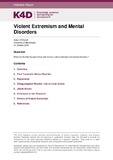| dc.contributor.author | O'Driscoll, Dylan | |
| dc.coverage.spatial | Somalia | en |
| dc.coverage.spatial | United Kingdom | en |
| dc.coverage.spatial | United States | en |
| dc.coverage.spatial | Islamic States | en |
| dc.date.accessioned | 2018-12-21T10:23:10Z | |
| dc.date.available | 2018-12-21T10:23:10Z | |
| dc.date.issued | 2018-10-01 | |
| dc.identifier.citation | O’Driscoll, D. (2018). Violent Extremism and Mental Health. K4D Helpdesk Report. Brighton, UK: Institute of Development Studies | en |
| dc.identifier.uri | https://opendocs.ids.ac.uk/opendocs/handle/20.500.12413/14208 | |
| dc.description.abstract | This rapid review synthesises findings on the link between violent extremism and mental disorders. Violent extremism is defined as ‘violence committed by an individual and/or group in support of a specific political or religious ideology, and this term is often used interchangeably with terrorism’ (Simi, Sporer, & Bubolz, 2016, p. 537). It is important to note that recent research argues that mental illness does not determine who will engage in violent extremism; rather it culminates in greater risk of involvement. Although this report focuses on mental illness, there are a number of different drivers of violent extremism, which are often interconnected, and for this reason these are also briefly discussed. The research on mental disorders and violent extremism has progressed significantly in recent years, however, many scholars argue that it is still not robust enough. The collection of data by the various law enforcement agencies encountering violent extremists is not robust enough and more work needs to be done on data collection to aid the understanding of the link between mental disorders and violent extremism. Therefore, there are many contradictions within the literature, as earlier work was too simplistic and thus too readily linked violent extremism to mental disorders. The understanding of the link between violent extremism and mental disorders is still developing and is currently overcoming the earlier less robust studies that unequivocally linked mental disorders to violent extremism and which is often taken up by the media and policy actors. The review found that higher exposure to trauma leads to greater likelihood of developing PTSD and makes an individual more likely to engage in violent extremism. Additionally, whilst a number of studies support that the number of risk factors (such as abuse, neglect, etc.) experienced during childhood, rather than any particular combination, are associated with childhood misconduct and potential later violence; much of the research points to a strong link between mental disorders and lone-actor violent extremists rather than group actors. Finally, it is argued that no mental health disorder appears to be a predictor of terrorist involvement and is rather just one of the many risk factors that push and pull individuals towards terrorist engagement. | en |
| dc.language.iso | en | en |
| dc.publisher | IDS | en |
| dc.relation.ispartofseries | K4D Helpdesk Report;476 | |
| dc.rights.uri | https://www.nationalarchives.gov.uk/doc/open-government-licence/version/3/ | en |
| dc.subject | Children and Youth | en |
| dc.subject | Governance | en |
| dc.subject | Health | en |
| dc.subject | Participation | en |
| dc.subject | Politics and Power | en |
| dc.subject | Poverty | en |
| dc.subject | Social Protection | en |
| dc.title | Violent Extremism and Mental Disorders | en |
| dc.type | Other | en |
| dc.rights.holder | © DFID - Crown copyright 2018. | en |
| dcterms.dateAccepted | 2018-10-01 | |
| rioxxterms.funder | Department for International Development, UK Government | en |
| rioxxterms.identifier.project | K4D | en |
| rioxxterms.version | VoR | en |
| rioxxterms.funder.project | 238a9fa4-fe4a-4380-996b-995f33607ba0 | en |

